Key takeaways:
- Establishing a consistent writing routine transformed the author’s approach, turning writing into a disciplined practice rather than a chaotic task.
- Setting realistic goals, such as a daily word count, helped maintain motivation and prevent burnout by allowing the author to celebrate small victories.
- Creating an inspiring writing environment and utilizing time management techniques, like the Pomodoro Technique, significantly improved productivity.
- Tracking progress and celebrating milestones reinforced motivation, helping the author appreciate their writing journey and maintain focus on future goals.
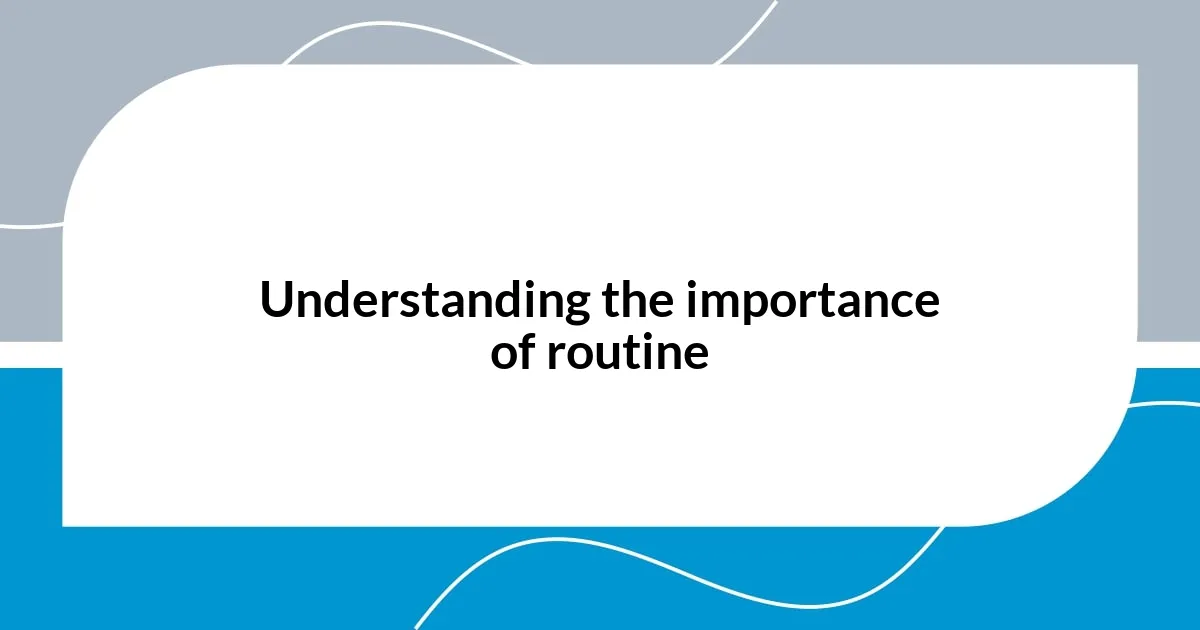
Understanding the importance of routine
A routine can serve as a solid foundation for my writing, transforming uncertainty into purposeful action. I remember the chaos of writing without one—sprinting between tasks with no clear direction. It often led to frustration and hesitation. Can you relate to the feeling of being stuck, staring at a blank page because you didn’t know what to tackle first?
Establishing a routine has been a game changer for me. It signals to my brain that it’s time to switch gears into “writing mode.” For example, I’ve made it a habit to write each morning with a hot cup of coffee in hand. That simple ritual not only sparks creativity but also creates a comforting space for my thoughts to flow freely. Have you ever noticed how small actions can lead to bigger shifts in your mindset?
Moreover, I’ve learned that a consistent routine can help build discipline. Writing used to feel like a daunting task, but now, with my schedule in place, it has become an integral part of my day. Understanding this importance has made it easier to push through writer’s block, as I no longer perceive writing as a chore but as a rewarding journey. Isn’t it fascinating how routine shapes not just our habits but our entire mindset towards creativity?
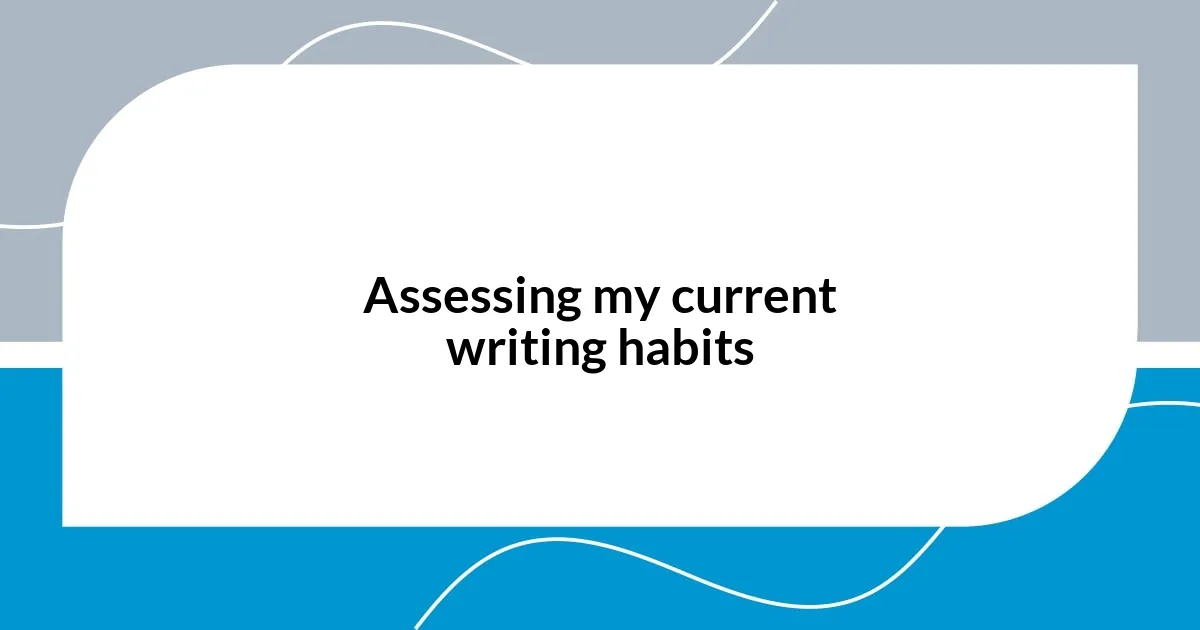
Assessing my current writing habits
Assessing my current writing habits has been quite the eye-opener for me. I remember the chaotic days when I’d write whenever inspiration struck, which often meant late at night or when I was already exhausted. Looking back, I can see how haphazard that approach was and how it drained my energy rather than fueling it.
To get a clearer picture of my habits, I took a bit of time to jot down what writing looks like for me on a daily basis. Here’s what I found:
- Inconsistent Schedule: I was writing at random times, which left me feeling unproductive.
- Environment Lacked Focus: My workspace was cluttered, distracting me when I tried to concentrate.
- Procrastination Tactics: I often found myself scrolling through social media instead of diving into my writing tasks.
- Limited Reflection: I rarely took time to review what I had wrote, missing opportunities to learn from my mistakes and insights.
This reflection highlighted the areas that needed improvement, and I knew I had to make changes to truly enjoy the writing process. Realizing how much these habits affected my creativity was both humbling and motivating.
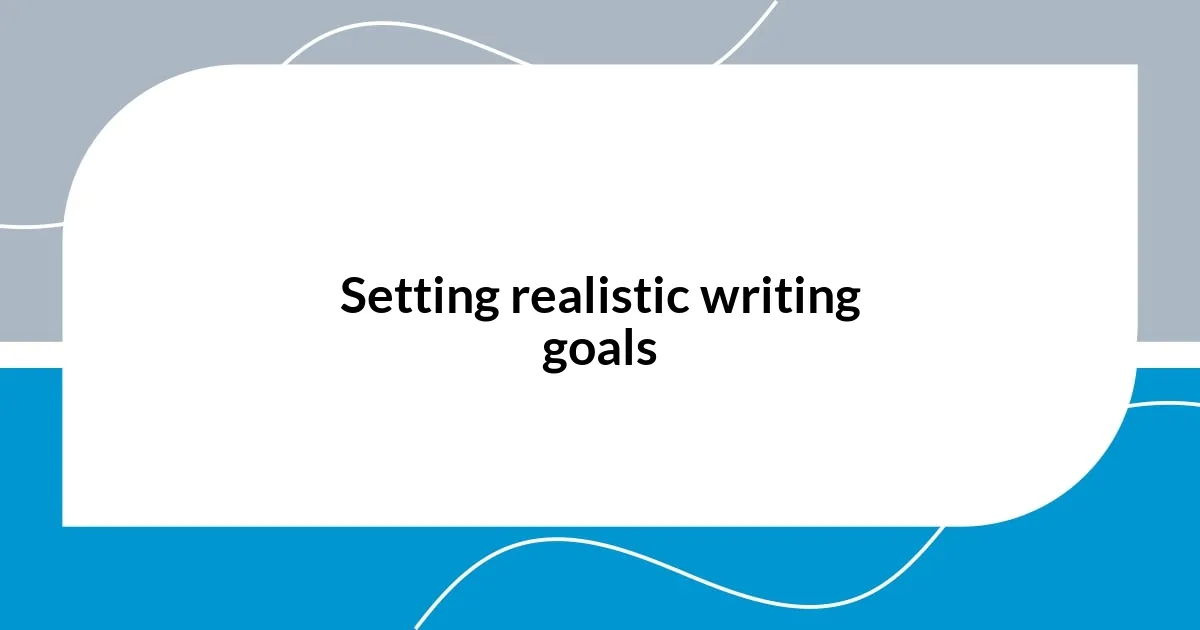
Setting realistic writing goals
Setting realistic writing goals has been a transformative journey for me. Early on, I made the mistake of aiming too high, like planning to write an entire novel in a month. Looking back, I realize how exhausting and demoralizing that felt. Instead, I found that breaking down larger goals into smaller, manageable tasks allowed me to celebrate mini-victories. Have you ever felt the thrill of crossing something off your list? That’s the magic of setting realistic goals.
Creating a daily word count goal was another turning point. At first, I thought 2,000 words a day was the way to go, but soon found myself burning out. So, I adjusted to 500 words, and to my surprise, that felt achievable! Each day, I could see progress without overwhelming myself. It was refreshing to feel accomplished—like running a marathon but enjoying the beautiful scenery along the way. What does your ideal goal look like?
I also learned to account for life’s unpredictability. There’s always a chance something will come up, whether it’s an urgent task or just a bad day. I decided it was better to have a flexible goal, allowing me to adapt without the guilt. For instance, some days I write only a paragraph, yet that still counts as progress. Embracing these realistic goals has not only improved my writing consistency but also allowed me to enjoy the journey more deeply.
| Type of Goal | Realistic Approach |
|---|---|
| Daily Count | 500 words instead of 2000 |
| Time Allocation | 1 hour daily; flexible schedule |
| Weekly Objective | Finish 1 chapter instead of whole book |

Choosing the right writing environment
Finding the right writing environment was a game changer for me. I used to write in a cramped corner of my living room, which was often filled with noise from the TV and other distractions. When I finally decided to create a dedicated writing space, everything shifted. I remember the day I transformed a spare room into my writing nook—it felt like unlocking a new level of productivity. Have you experienced that moment when the perfect environment clicks?
I quickly realized that lighting and comfort play crucial roles in my focus. I invested in a good desk lamp and an ergonomic chair, which might seem insignificant, but they made all the difference. Now, I look forward to my writing hours, surrounded by a clean, organized space filled with inspiring books and my favorite quotes plastered on the walls. This personal touch keeps my creativity flowing, making me feel right at home. So, have you thought about how your surroundings can impact your writing?
Moreover, I discovered that solitude is a vital aspect of my creative process. Initially, I felt guilty about needing quiet time, especially in a busy household. But now, I embrace it. I often retreat to a local café or, even better, an inspiring park, where the natural sounds act as my background music. It’s fascinating how these environments can trigger different ideas and moods. Do you feel that shift when you change your writing scenery, too?

Implementing time management techniques
Implementing effective time management techniques has been instrumental in developing my writing routine. I remember my early attempts to write whenever the mood struck, which often led to procrastination and frustration. Realizing that I needed structure, I started blocking out specific times in my day dedicated solely to writing. Have you ever felt that satisfying rush of productivity when you stick to a schedule? It’s empowering!
I also discovered the power of using timers. Initially, I was skeptical about the Pomodoro Technique, which involves working in focused bursts followed by short breaks. But when I tried it, I was amazed at how much I could accomplish in just 25 minutes. I often set a timer for those intervals, compelling myself to concentrate without distractions, and it feels almost like a little game. What about you? Do you find that working against the clock spurs your creativity?
Finally, I’ve learned to prioritize my writing tasks each week. Each Sunday, I reflect on my upcoming week and set clear intentions for what I want to achieve. I jot down which chapters to tackle or blogs to draft, ensuring I dedicate time to high-priority projects. It creates a roadmap I can follow, making the writing process feel more intentional. Have you tried planning out your week? It might just be the key to unlocking new levels of productivity for you, too!
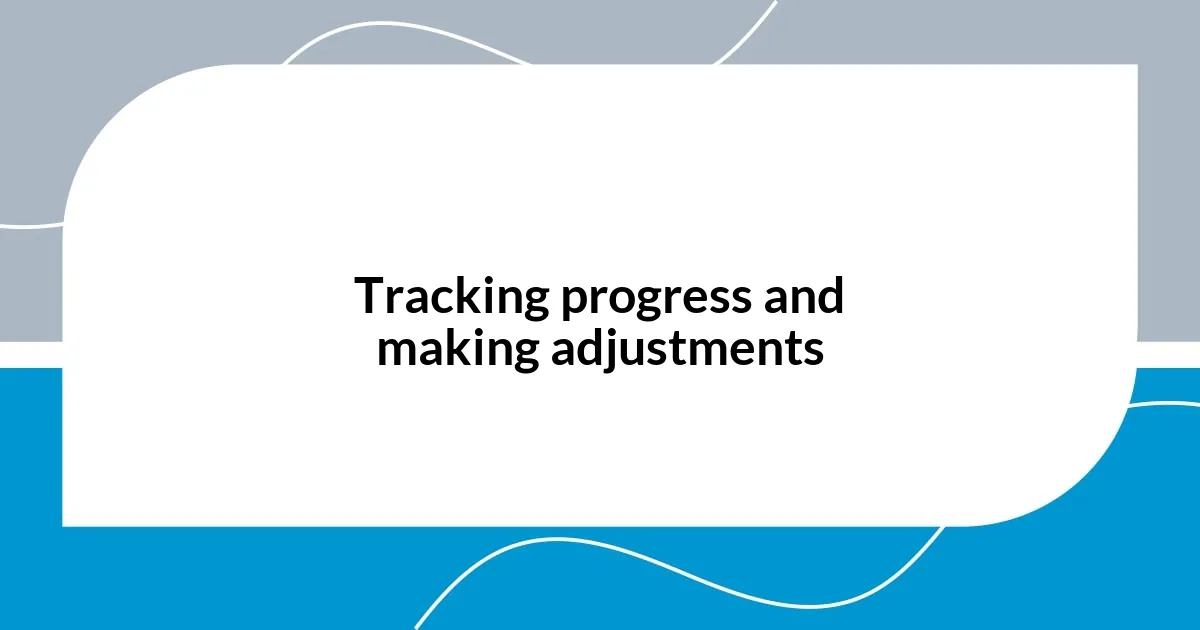
Tracking progress and making adjustments
Tracking my writing progress has been an eye-opener. I started keeping a simple journal, noting down daily word counts and reflections on how I felt during my writing sessions. It was fascinating to see patterns emerge—some days I wrote furiously, while on others, it felt like pulling teeth. Have you ever wondered how your mood impacts your writing output? For me, those notes not only revealed how my emotional state influenced my productivity but also helped me identify the times of day when I was most creative.
As I analyzed my progress, I realized adjustments were necessary. When a certain technique or environment wasn’t yielding results, I leaned into experimentation. I once shifted my writing time from late evenings to early mornings, only to discover that my mind was sharper and more inspired with the sunrise. It was a lesson in flexibility; embracing changes made my routine not just effective, but enjoyable. Has making such adjustments made a difference in your routine? I genuinely think that being open to change can spark new ideas and approaches.
Over time, I started tracking specific goals, like completing a short story or finishing a chapter within a week. Celebrating those small wins, like treating myself to my favorite coffee after hitting a milestone, reinforced my motivation to keep going. I found if I didn’t actively recognize these achievements, it was easy to lose sight of progress amidst the daily grind. What do you do to keep yourself motivated in your writing journey? I believe acknowledging these milestones can give you the boost you need to push through those tougher writing sessions.
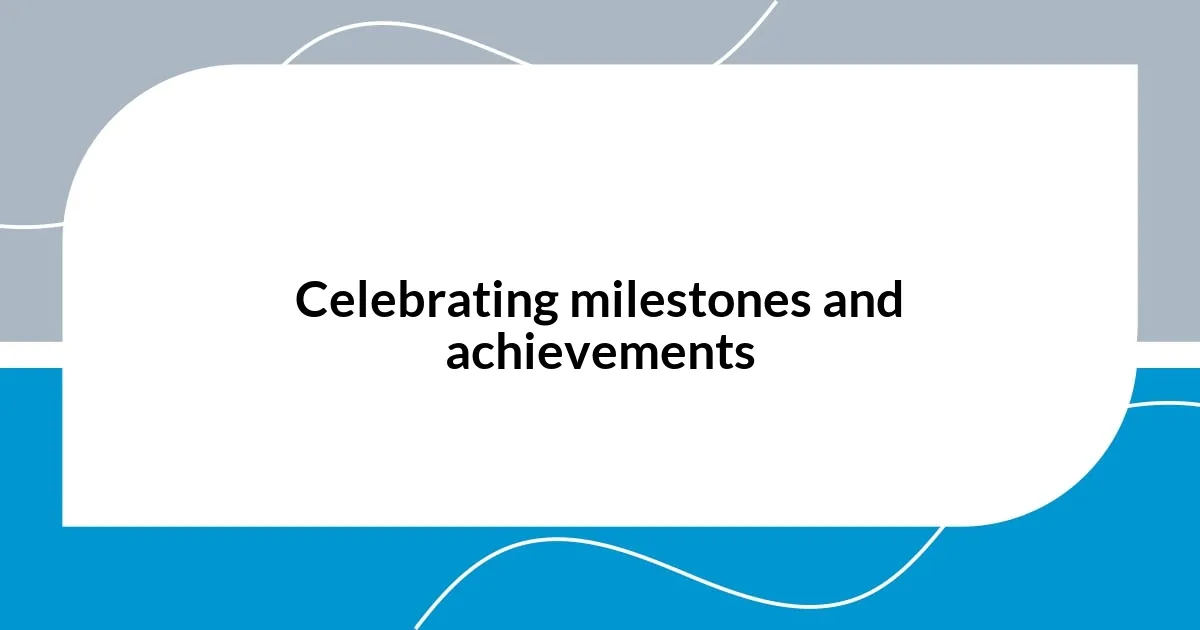
Celebrating milestones and achievements
Celebrating milestones has been a game-changer for me. I remember the thrill I felt when I completed my first draft of a novel; I almost danced around my living room! Taking the time to acknowledge these moments, whether big or small, has helped me build a positive relationship with my writing process. Have you ever paused to celebrate even the tiniest victories in your own work? It’s those moments of recognition that fuel our creative fire.
Another memorable experience was when I reached my goal of writing consistently for 30 days straight. I treated myself to a nice dinner, savoring every bite as a reward for my dedication. It wasn’t just a meal; it symbolized my hard work and commitment. I felt proud, and in that moment, I realized that celebrating achievements doesn’t merely mark an end; it propels us forward with renewed energy. Don’t you think a little celebration can enhance your motivation, too?
Reflecting on these milestones also brings a sense of clarity. When I tracked my achievements on a vision board, it motivated me to push through challenging days. Each completed task felt like a stepping stone, and looking back at them made me appreciate the journey. Have you ever made a visual representation of your goals? It can be truly powerful to see your progress laid out before you, acting as a constant reminder that every effort counts.